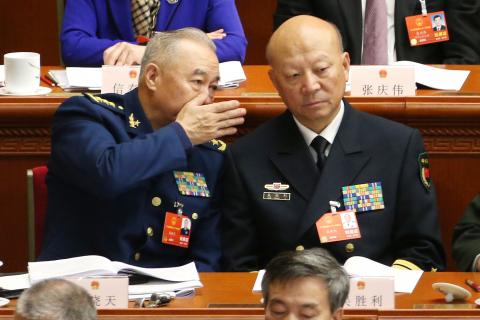The Ministry of National Defense yesterday reiterated President Tsai Ing-wen’s (蔡英文) pledge to increase the nation’s defense spending every year after this fiscal year.
The statement came after China announced it would raise its military spending this year.
China’s official military budget is to be 1.11 trillion yuan (US$175.1 billion), a 8.1 percent increase from last year, when China raised the budget 7 percent, Xinhua news agency reported.

Photo: EPA
Tsai has pledged to raise to the defense budget every year and earmark expenditures for planned procurements, ministry spokesman Major General Chen Chung-chi (陳中吉) said.
The government is also to make special budget proposals to cover the costs of major unplanned arms deals, instead of deducting such expenses from the defense budget, Chen said.
“This ministry is committed to promoting national defense autonomy and the security of our nation,” he said.
Meanwhile, China’s Taiwan Affairs Office Minister Zhang Zhijun (張志軍) blamed Taiwan for “increasingly severe and complicated” cross-strait relations at a news event yesterday marking the opening of China’s 13th National People’s Congress.
“We have resolute will, full confidence and even fuller ability to prevent any sort or form of Taiwan independence separatist acts,” Zhang said.
China has “encountered more risks and challenges” in cross-strait relations due to Taiwan’s refusal to acknowledge the so-called “1992 consensus” and “more forceful interventions by outside forces,” Zhang added.
The “1992 consensus,” a term former Mainland Affairs Council chairman Su Chi (蘇起) in 2006 admitted to making up in 2000, refers to a supposed tacit understanding between the Chinese Nationalist Party (KMT) and the Chinese Communist Party that both sides of the Taiwan Strait acknowledge there is “one China,” with each side having its own interpretation of what “China” means.
Taiwan is not the side that has been acting in ways that are detrimental to the relationship, Presidential Office spokesman Alex Huang (黃重諺) said.
The government’s commitment to peace and goodwill has been clear and consistent, a fact that is not missed by the international community, he said.
“The goodwill and promises of this government are unchanged. We have no intention of returning the nation to a confrontational course of action or bowing to pressure,” he said.

Tropical Storm Gaemi strengthened into a typhoon at 2pm yesterday, and could make landfall in Yilan County tomorrow, the Central Weather Administration (CWA) said yesterday. The agency was scheduled to issue a sea warning at 11:30pm yesterday, and could issue a land warning later today. Gaemi was moving north-northwest at 4kph, carrying maximum sustained winds near its center of up to 118.8kph and gusts of 154.8kph. The circumference is forecast to reach eastern Taiwan tomorrow morning, with the center making landfall in Yilan County later that night before departing from the north coast, CWA weather forecaster Kuan Shin-ping (官欣平) said yesterday. Uncertainty remains and

SEA WARNING LIKELY: The storm, named Gaemi, could become a moderate typhoon on Wednesday or Thursday, with the Taipei City Government preparing for flooding A tropical depression east of the Philippines developed into a tropical storm named Gaemi at 2pm yesterday, and was moving toward eastern Taiwan, the Central Weather Administration (CWA) said. Gaemi could begin to affect Taiwan proper on Tuesday, lasting until Friday, and could develop into a moderate typhoon on Wednesday or Thursday, it said. A sea warning for Gaemi could be issued as early as Tuesday morning, it added. Gaemi, the third tropical storm in the Pacific Ocean this typhoon season, is projected to begin moving northwest today, and be closest to Taiwan on Wednesday or Thursday, the agency said. Today, there would likely

DISRUPTIONS: The high-speed rail is to operate as normal, while several airlines either canceled flights or announced early departures or late arrivals Schools and offices in 15 cities and counties are to be closed today due to Typhoon Gaemi, local governments announced last night. The 15 are: Taipei, New Taipei City, Taoyuan, Tainan, Keelung, Hsinchu and Kaohsiung, as well as Yilan, Hualien, Hsinchu, Miaoli, Chiayi, Pingtung, Penghu and Lienchiang counties. People should brace for torrential rainfall brought by the storm, with its center forecast to make landfall on the east coast between tonight and tomorrow morning, the Central Weather Administration (CWA) said. The agency issued a sea warning for the typhoon at 11:30pm on Monday, followed by a land warning at 11:30am yesterday. As of

CASUALTY: A 70-year-old woman was killed by a falling tree in Kaohsiung as the premier warned all government agencies to remain on high alert for the next 24 hours Schools and offices nationwide are to be closed for a second day today as Typhoon Gaemi crosses over the nation, bringing torrential rain and whipping winds. Gaemi was forecast to make landfall late last night. From Tuesday night, its outer band brought substantial rainfall and strong winds to the nation. As of 6:15pm last night, the typhoon’s center was 20km southeast of Hualien County, Central Weather Administration (CWA) data showed. It was moving at 19kph and had a radius of 250km. As of 3pm yesterday, one woman had died, while 58 people were injured, the Central Emergency Operation Center said. The 70-year-old